Welcome to, 'This House' where Movie Parliament ministers discuss a proposed motion and then you, the reader, votes on whether or not it passes. This month, we are turning our attention to the cinema going experience itself. With Netflix now becoming a dominant force in both film production and distribution, is a trip to the cinema becoming a thing of the past? Will changes in viewing habits threaten the movie theater's dominance as the only place to legally see a new release? Read our thoughts below and then cast your vote. Is the cinema going experience dead?
Proposition
Victor Escobar - @VicAEsco
This past Sunday, I went out to the movies to see Dash Shaw’s, 'My Entire High School Sinking Into the Sea'. It involved a thirty minute trip to the Laemmle Theater in Santa Monica, $10 for popcorn and a soda, and in the end, my parking came out to $10.50, and that’s all on top of the price of the movie ticket. I didn’t need to see My Entire High School Sinking Into the Sea in a theater. It would’ve played just as well had I seen it at home on Netflix and I would’ve spent a hell of a lot less. My Netflix subscription is less than the parking was. Of course, I didn’t need snacks but that’s essentially what the movie going experience has become. Which theater has the best snacks and drinks?
So many theaters in my area have recently undergone renovations that include actual food, a bar, reclining seats, and $15 - $20 tickets. While it’s nice to have a drink at the movies, I’m not paying $20 for Boss Baby. The cinema going experience is dead and it’s not the fault of the movies themselves. A good movie is a good movie no matter what cinema it is seen at.
Streaming services are partially to blame. 4K televisions are affordable now and everybody has Netflix. There’s really no reason to go out to the movies anymore when you can have a far more comfortable viewing experience at home. As a cinephile, it hurts to write that sentence but going out to the movies only seems logical when it comes to event films. The Fate of the Furious will play much better on an IMAX screen with a crowd than it will in your home. In addition to that, you know it’s the movie that everyone will be talking about within the next few days.
You can blame the theater chains as well. As attendance has gone down, prices have gone up to make up for losses. $15 tickets, $5 parking, an additional $3 cause it’s in 3D, and $6 for a small popcorn. The magic of the movies is that it’s a communal experience but how can it be when it costs a family of four about $60 just for the tickets?
To be honest, I don’t know what theaters can do to bring the experience back. The screens can only get so big. It’s worth it for summer blockbusters but unless you’re into it, what’s the point of seeing an indie in theaters when it’ll be on Netflix in a few months. As for myself, I love the movies. I have a nice tv at home and I have a Netflix and Amazon Prime subscription but it will never feel like going to the movies. I love the big screen, I love the sound, I love the darkness, I love the community of it, I love my large popcorn and cherry coke, and I love searching for that perfect seat but I don’t blame you if you don’t go out to the movies. I wouldn’t even try to convince you.
This past Sunday, I went out to the movies to see Dash Shaw’s, 'My Entire High School Sinking Into the Sea'. It involved a thirty minute trip to the Laemmle Theater in Santa Monica, $10 for popcorn and a soda, and in the end, my parking came out to $10.50, and that’s all on top of the price of the movie ticket. I didn’t need to see My Entire High School Sinking Into the Sea in a theater. It would’ve played just as well had I seen it at home on Netflix and I would’ve spent a hell of a lot less. My Netflix subscription is less than the parking was. Of course, I didn’t need snacks but that’s essentially what the movie going experience has become. Which theater has the best snacks and drinks?
So many theaters in my area have recently undergone renovations that include actual food, a bar, reclining seats, and $15 - $20 tickets. While it’s nice to have a drink at the movies, I’m not paying $20 for Boss Baby. The cinema going experience is dead and it’s not the fault of the movies themselves. A good movie is a good movie no matter what cinema it is seen at.
Streaming services are partially to blame. 4K televisions are affordable now and everybody has Netflix. There’s really no reason to go out to the movies anymore when you can have a far more comfortable viewing experience at home. As a cinephile, it hurts to write that sentence but going out to the movies only seems logical when it comes to event films. The Fate of the Furious will play much better on an IMAX screen with a crowd than it will in your home. In addition to that, you know it’s the movie that everyone will be talking about within the next few days.
You can blame the theater chains as well. As attendance has gone down, prices have gone up to make up for losses. $15 tickets, $5 parking, an additional $3 cause it’s in 3D, and $6 for a small popcorn. The magic of the movies is that it’s a communal experience but how can it be when it costs a family of four about $60 just for the tickets?
To be honest, I don’t know what theaters can do to bring the experience back. The screens can only get so big. It’s worth it for summer blockbusters but unless you’re into it, what’s the point of seeing an indie in theaters when it’ll be on Netflix in a few months. As for myself, I love the movies. I have a nice tv at home and I have a Netflix and Amazon Prime subscription but it will never feel like going to the movies. I love the big screen, I love the sound, I love the darkness, I love the community of it, I love my large popcorn and cherry coke, and I love searching for that perfect seat but I don’t blame you if you don’t go out to the movies. I wouldn’t even try to convince you.
Opposition
Minister for History, Leonhard Balk:
Is the cinema going experience dead? In short, no.
All across the world, between independent cinemas and national film institutes, people still have plenty of options regarding high-end film screenings. If you’re living in a mid- to large-sized city, chances are that there is at least one such cinema in your area. A place where you can watch The Salesman without having to sit through 30 minutes of ads and where you can buy a drink without breaking the bank. A place where the lights dim at the right time and to the right level, the film is screened properly (either from a DCP which has been carefully tested beforehand, or maybe even from a 35m copy). A place that has a projectionist!
I spend most of my regular cinema visits here in Berlin at local independent theatres. Sometimes, I’ll go to the flagship multiplex in the city centre, where Obamas daughters went when he was visiting, for big blockbusters and their IMAX screen. I rarely go inside run-of-the-mill multiplexes, which is why, when I do, I find it disturbing how different my overall viewing experience is. Look, I won’t list everything that’s wrong about the modern multiplex, how they’re savagely minimizing their expenses and maximizing their costs, always to the detriment of the actual screening (Edward Jay Epstein's article “The Popcorn Palace Economy” sums this up nicely). What I will say is that I think big cinema chains (and, to a large extent, Hollywood) are reacting to imagined threats. Someone, somewhere told them that cinema is dying and that everyone, everywhere is now either watching pirated cam-footage on their smartphone, or streaming Sandy Wexler on Netflix. Yes, the internet is scary, but the reality is that going to the cinema is just as popular as ever, while box office revenues are reaching record heights. Still, the average ticket price is rising, with premiums for 3D movies partly to blame, and movie theatres ever hungry to find new ways of reducing costs.
Cinema is not dead and neither is the cinema going experience. We can see film fandom and cinephilia blossoming every time we open up our internet browser. Just because movie theatre chain executives believe the cinema is dying, doesn’t mean you should believe it too. Go see The Lost City of Z in 35mm, if you can. Watch the new restoration of One Flew Over the Cuckoo’s Nest. Whatever you do, don’t go to a movie theatre where they hate film.
Is the cinema going experience dead? In short, no.
All across the world, between independent cinemas and national film institutes, people still have plenty of options regarding high-end film screenings. If you’re living in a mid- to large-sized city, chances are that there is at least one such cinema in your area. A place where you can watch The Salesman without having to sit through 30 minutes of ads and where you can buy a drink without breaking the bank. A place where the lights dim at the right time and to the right level, the film is screened properly (either from a DCP which has been carefully tested beforehand, or maybe even from a 35m copy). A place that has a projectionist!
I spend most of my regular cinema visits here in Berlin at local independent theatres. Sometimes, I’ll go to the flagship multiplex in the city centre, where Obamas daughters went when he was visiting, for big blockbusters and their IMAX screen. I rarely go inside run-of-the-mill multiplexes, which is why, when I do, I find it disturbing how different my overall viewing experience is. Look, I won’t list everything that’s wrong about the modern multiplex, how they’re savagely minimizing their expenses and maximizing their costs, always to the detriment of the actual screening (Edward Jay Epstein's article “The Popcorn Palace Economy” sums this up nicely). What I will say is that I think big cinema chains (and, to a large extent, Hollywood) are reacting to imagined threats. Someone, somewhere told them that cinema is dying and that everyone, everywhere is now either watching pirated cam-footage on their smartphone, or streaming Sandy Wexler on Netflix. Yes, the internet is scary, but the reality is that going to the cinema is just as popular as ever, while box office revenues are reaching record heights. Still, the average ticket price is rising, with premiums for 3D movies partly to blame, and movie theatres ever hungry to find new ways of reducing costs.
Cinema is not dead and neither is the cinema going experience. We can see film fandom and cinephilia blossoming every time we open up our internet browser. Just because movie theatre chain executives believe the cinema is dying, doesn’t mean you should believe it too. Go see The Lost City of Z in 35mm, if you can. Watch the new restoration of One Flew Over the Cuckoo’s Nest. Whatever you do, don’t go to a movie theatre where they hate film.
Abstention
Prime Minister, Michael Dalton:
Back in March, Netflix CEO Reed Hastings argued that movie theaters hadn’t innovated beyond popcorn. With the rise of his platform and the growing likelihood of day and date releases, the cinema is coming under increasing threat. At CinemaCon, Sony Pictures chairman Tom Rothman shot back by saying, ‘Netfllix my ass’ after showing preview footage of the upcoming, ‘Blade Runner: 2049’. Whilst, ‘the death of cinema’ has been proclaimed time and again in the past only to be proven wrong, there is a particular potency about the way in which the viewing landscape has changed over the past decade.
On demand services have made movie theaters look increasingly archaic, or rather, the observed time window between a theatrical and home release has begun to look increasingly archaic. With filmmakers such as Martin Scorsese now turning to Netflix to realize their projects, it is not unfounded for the film industry, and us cinephiles, to worry about where distribution is headed, and what the knock-on effect could be for box office receipts.
However, the cinematic experience goes beyond the confines of the cinema. In IndieWire, Chris O'Falt wrote how critics and showrunners needed to find another word to describe quality television than cinematic, arguing that it represented an outdated relationship between the mediums. Such an argument is telling, as it shows that even on the small screen we can experience something cinematic, and that our ultimate barometer for visual storytelling takes its cue from the movies. Two conclusion could be drawn from this. One is that in the future we will not need to physically go to the cinema in order to have a cinema going experience, as advancements in technology continue to improve home viewing, and streaming services become an increasingly attractive platform for filmmakers. The other, is that no matter how impressive home viewing gets, we will always see the cinema as the most worthy venue for a certain scale of visual storytelling.
Something else worthy of consideration is how this challenge to cinema going habits could result in the exact revitalization cinemas need. For cinephiles like us the death of the cinema going experience is not necessarily represented by Netflix's foray into filmmaking, but rather the ads, noisy snacks, and poor projection standards. Mark Kermode has argued that a norm of day and date releases would leave cinemas filled only by those who want to be there, and who would therefore appreciate the sanctity of the venue. Alongside this rise in ‘home viewing’ we’ve seen a concurrent rise in, ‘boutique’ cinema experiences. Whether it be Secret Cinema or art houses serving quality food and drink, certain theaters are relishing the opportunity to give you something you can’t get at home. The recent Secret Cinema release of, ‘Moulin Rouge’ was so popular it spent multiple weeks in the U.K. box office top ten. Whilst blockbusters chase viewer retention through bragging about 3D or IMAX, it may be that the key to saving the cinema going experience lies not with the films, but rather the cinemas that show them. Could the cinema going experience evolve into something that is less about the film itself and how new it is, but rather the experience around the film?
Ultimately, I choose to abstain as I believe that the cinema going experience isn’t dead but is evolivng. What separates the cinema from anything else is that feeling of community and shared experience, as well as the sense of awe that only a massive screen can provide. It is naïve to think that changes in viewing habits and technology won’t significantly impact cinema going as they have already. Nevertheless, cinemas have proven resilient and whilst cinema going may be challenged the cinematic experience can never die. It speaks to a sense of scale, scope and immersion, which whilst possible to achieve elsewhere will always owe a debt to the movie theater. The experience lives, even if it's fundamentally changing in character.
Back in March, Netflix CEO Reed Hastings argued that movie theaters hadn’t innovated beyond popcorn. With the rise of his platform and the growing likelihood of day and date releases, the cinema is coming under increasing threat. At CinemaCon, Sony Pictures chairman Tom Rothman shot back by saying, ‘Netfllix my ass’ after showing preview footage of the upcoming, ‘Blade Runner: 2049’. Whilst, ‘the death of cinema’ has been proclaimed time and again in the past only to be proven wrong, there is a particular potency about the way in which the viewing landscape has changed over the past decade.
On demand services have made movie theaters look increasingly archaic, or rather, the observed time window between a theatrical and home release has begun to look increasingly archaic. With filmmakers such as Martin Scorsese now turning to Netflix to realize their projects, it is not unfounded for the film industry, and us cinephiles, to worry about where distribution is headed, and what the knock-on effect could be for box office receipts.
However, the cinematic experience goes beyond the confines of the cinema. In IndieWire, Chris O'Falt wrote how critics and showrunners needed to find another word to describe quality television than cinematic, arguing that it represented an outdated relationship between the mediums. Such an argument is telling, as it shows that even on the small screen we can experience something cinematic, and that our ultimate barometer for visual storytelling takes its cue from the movies. Two conclusion could be drawn from this. One is that in the future we will not need to physically go to the cinema in order to have a cinema going experience, as advancements in technology continue to improve home viewing, and streaming services become an increasingly attractive platform for filmmakers. The other, is that no matter how impressive home viewing gets, we will always see the cinema as the most worthy venue for a certain scale of visual storytelling.
Something else worthy of consideration is how this challenge to cinema going habits could result in the exact revitalization cinemas need. For cinephiles like us the death of the cinema going experience is not necessarily represented by Netflix's foray into filmmaking, but rather the ads, noisy snacks, and poor projection standards. Mark Kermode has argued that a norm of day and date releases would leave cinemas filled only by those who want to be there, and who would therefore appreciate the sanctity of the venue. Alongside this rise in ‘home viewing’ we’ve seen a concurrent rise in, ‘boutique’ cinema experiences. Whether it be Secret Cinema or art houses serving quality food and drink, certain theaters are relishing the opportunity to give you something you can’t get at home. The recent Secret Cinema release of, ‘Moulin Rouge’ was so popular it spent multiple weeks in the U.K. box office top ten. Whilst blockbusters chase viewer retention through bragging about 3D or IMAX, it may be that the key to saving the cinema going experience lies not with the films, but rather the cinemas that show them. Could the cinema going experience evolve into something that is less about the film itself and how new it is, but rather the experience around the film?
Ultimately, I choose to abstain as I believe that the cinema going experience isn’t dead but is evolivng. What separates the cinema from anything else is that feeling of community and shared experience, as well as the sense of awe that only a massive screen can provide. It is naïve to think that changes in viewing habits and technology won’t significantly impact cinema going as they have already. Nevertheless, cinemas have proven resilient and whilst cinema going may be challenged the cinematic experience can never die. It speaks to a sense of scale, scope and immersion, which whilst possible to achieve elsewhere will always owe a debt to the movie theater. The experience lives, even if it's fundamentally changing in character.
Opposition
Minister for Foreign Affairs, Arnaud Trouvé:
It may not be dead, but a certain idea of the cinema going experience is on life support.
Throughout the years, a kind of moviegoing experience has expanded, to become our common goal: just take a look at last week’s international box-office to realize that people all around the world, from Brazil to Europe, have come en masse to see the latest Fast & Furious. Not that there’s anything inherently wrong with a blockbuster (I saw Furious 7 in theaters), but the fact that this type of film is getting wider simultaneous box-office openings, almost becoming prototypes of themselves & the only option for entertainment, is a serious threat to films in general.
The multiplex doesn’t really care for our well-being; it’s like a fast-food chain that will serve the same meal to everyone, and make sure you pay the bucks and watch the ads. I dream of a theater where the 20-minute prologue before the film would not only be ads & trailers, but a real place to broadcast short films. I hope post-credits scenes would stop being what they are now: advertisements. I pray that our most daring filmmakers would consider moving back to the big screen.
When Sofia Coppola & Christopher Nolan urge fans to watch films in cinemas, I feel their sincerity. Should Inception have been distributed on VOD? The Virgin Suicides on your phone? Even if it’s technically possible, it doesn’t mean it’s suitable.
For the first time ever, two films of the Cannes competition are entirely produced & released by Netflix. The streaming giant has helped finance & broadcast some of the best TV shows in recent years. I won’t start making the list. But their rise towards film distribution is becoming concerning.
On one hand, I understand they help indie films that would struggle to find distributors here in France. Being a Netflix customer myself, I am happy to be able to watch the latest Sundance Grand Jury winner: I Don’t Feel At Home In This World Anymore. Or the sequel to the Spanish greatest hit of all time: Ocho Apellidos Catalanes. Given that multiplexes prefer you to see Fast&Furious 12 or Star Wars 11, it’s a shame that distributing those indie gems always falls into the hands of small venues, who already struggle for their survival and have to subsequently take all the risks.
But when Netflix puts their hand on the prestigious Cannes line-up, I think it goes too far. When announcing the films competing for the Palme d’Or, Thierry Frémaux revealed that two of them were Netflix productions, and thus may skip the theater slot: Okja by Bong Joon-Ho (The Host, Snowpiercer) and The Meyerowitz Stories by Noah Baumbach (starring all-time Netflix ambassador Adam Sandler!). I don’t want to be a purist, but a Cannes competition slot is rather unique, affecting only 20 films a year. Having to be a Cannes happy few to enjoy this film in a theater is beyond me.
Our theatrical exhibitors have already protested this decision. And the conflict is far from being solved: our media chronology only allowing a minimum 3-year window between the release of a film & its broadcast on SVOD platforms. This is, to say the least, not exactly what Netflix had in mind. Some would argue that 3 films of the Cannes 2010 line-up never got released in France. But these were titles that didn’t have the star-power wattage of Okja or Meyerowitz (Sandler, but also Tilda Swinton, Jake Gyllenhaal,...), and thus were not able to compete in blockbuster territory in the first place.
We now have an opportunity to revive the cinema going experience with films acclaimed by auteurs & fans alike. Let’s not miss it.
It may not be dead, but a certain idea of the cinema going experience is on life support.
Throughout the years, a kind of moviegoing experience has expanded, to become our common goal: just take a look at last week’s international box-office to realize that people all around the world, from Brazil to Europe, have come en masse to see the latest Fast & Furious. Not that there’s anything inherently wrong with a blockbuster (I saw Furious 7 in theaters), but the fact that this type of film is getting wider simultaneous box-office openings, almost becoming prototypes of themselves & the only option for entertainment, is a serious threat to films in general.
The multiplex doesn’t really care for our well-being; it’s like a fast-food chain that will serve the same meal to everyone, and make sure you pay the bucks and watch the ads. I dream of a theater where the 20-minute prologue before the film would not only be ads & trailers, but a real place to broadcast short films. I hope post-credits scenes would stop being what they are now: advertisements. I pray that our most daring filmmakers would consider moving back to the big screen.
When Sofia Coppola & Christopher Nolan urge fans to watch films in cinemas, I feel their sincerity. Should Inception have been distributed on VOD? The Virgin Suicides on your phone? Even if it’s technically possible, it doesn’t mean it’s suitable.
For the first time ever, two films of the Cannes competition are entirely produced & released by Netflix. The streaming giant has helped finance & broadcast some of the best TV shows in recent years. I won’t start making the list. But their rise towards film distribution is becoming concerning.
On one hand, I understand they help indie films that would struggle to find distributors here in France. Being a Netflix customer myself, I am happy to be able to watch the latest Sundance Grand Jury winner: I Don’t Feel At Home In This World Anymore. Or the sequel to the Spanish greatest hit of all time: Ocho Apellidos Catalanes. Given that multiplexes prefer you to see Fast&Furious 12 or Star Wars 11, it’s a shame that distributing those indie gems always falls into the hands of small venues, who already struggle for their survival and have to subsequently take all the risks.
But when Netflix puts their hand on the prestigious Cannes line-up, I think it goes too far. When announcing the films competing for the Palme d’Or, Thierry Frémaux revealed that two of them were Netflix productions, and thus may skip the theater slot: Okja by Bong Joon-Ho (The Host, Snowpiercer) and The Meyerowitz Stories by Noah Baumbach (starring all-time Netflix ambassador Adam Sandler!). I don’t want to be a purist, but a Cannes competition slot is rather unique, affecting only 20 films a year. Having to be a Cannes happy few to enjoy this film in a theater is beyond me.
Our theatrical exhibitors have already protested this decision. And the conflict is far from being solved: our media chronology only allowing a minimum 3-year window between the release of a film & its broadcast on SVOD platforms. This is, to say the least, not exactly what Netflix had in mind. Some would argue that 3 films of the Cannes 2010 line-up never got released in France. But these were titles that didn’t have the star-power wattage of Okja or Meyerowitz (Sandler, but also Tilda Swinton, Jake Gyllenhaal,...), and thus were not able to compete in blockbuster territory in the first place.
We now have an opportunity to revive the cinema going experience with films acclaimed by auteurs & fans alike. Let’s not miss it.
Closing Remarks
What do you think? Is the cinema going experience dead? And if so what's killed it? Soulless multiplexes or imperious streaming platforms? Or does the cinema still offer an experience of such immersion that it is impenetrable to technological development and changes in viewing habits? Are there ways in which cinemas could save themselves? Join the discussion in the comments below and vote in the poll to decide whether or not the motion passes.
Is the cinema going experience dead?
Is the cinema going experience dead?
Propose a Motion
Have a motion you'd like us to discuss? Suggest topics in the comments below.
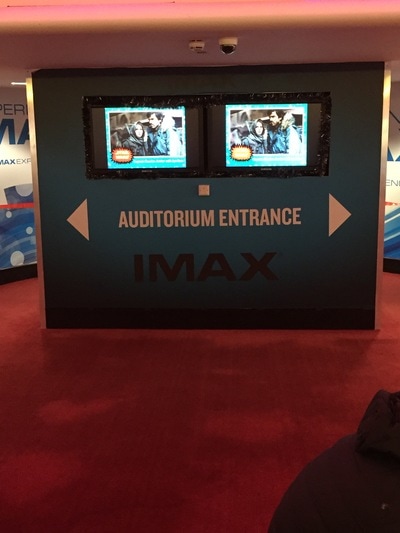
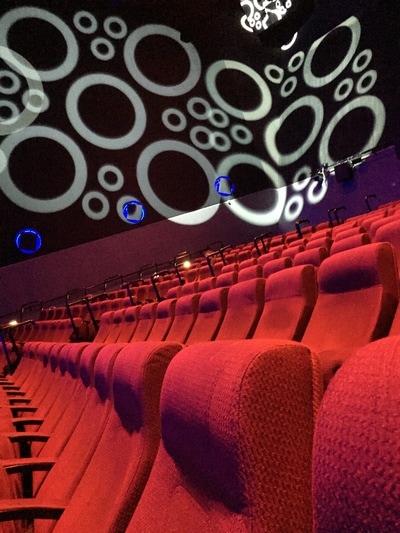
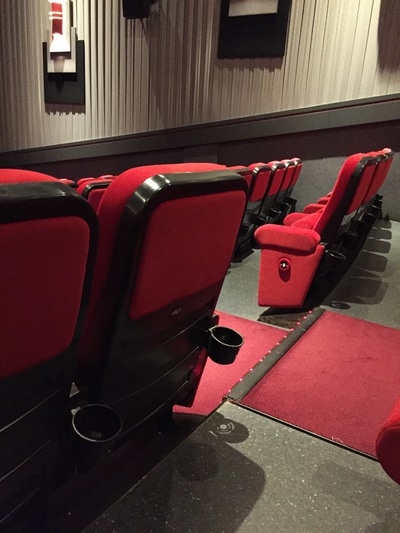
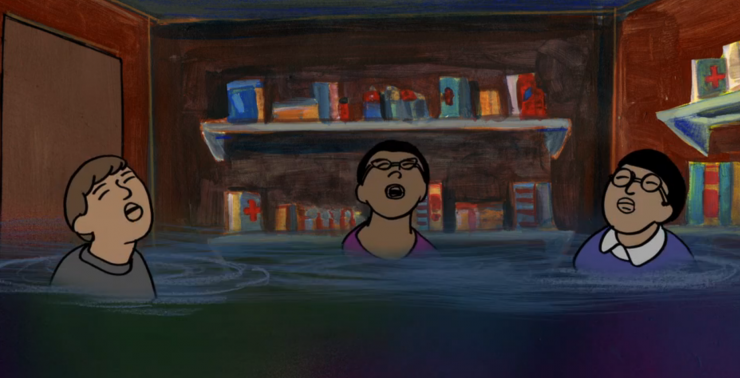
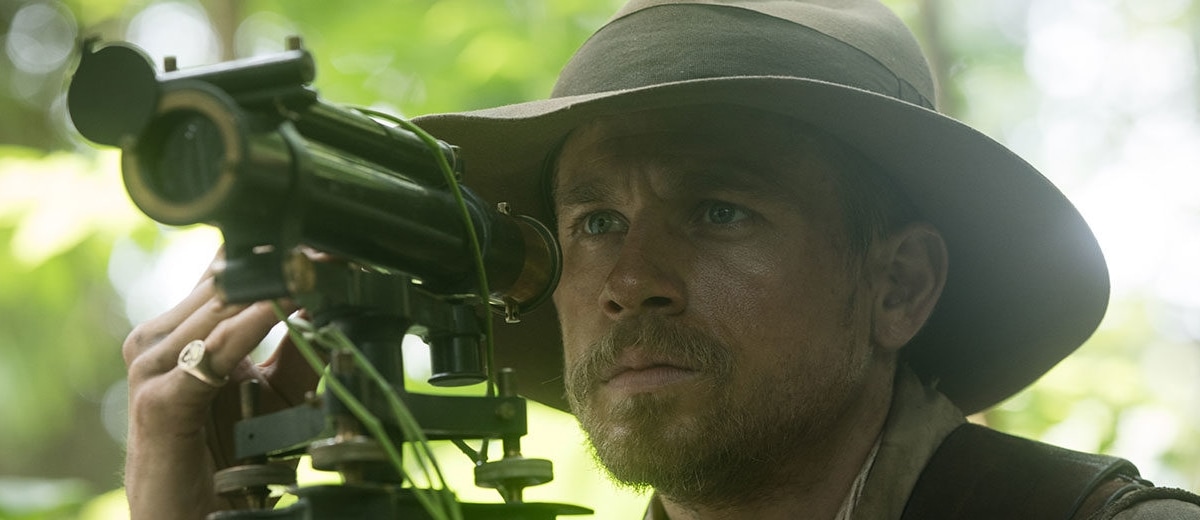
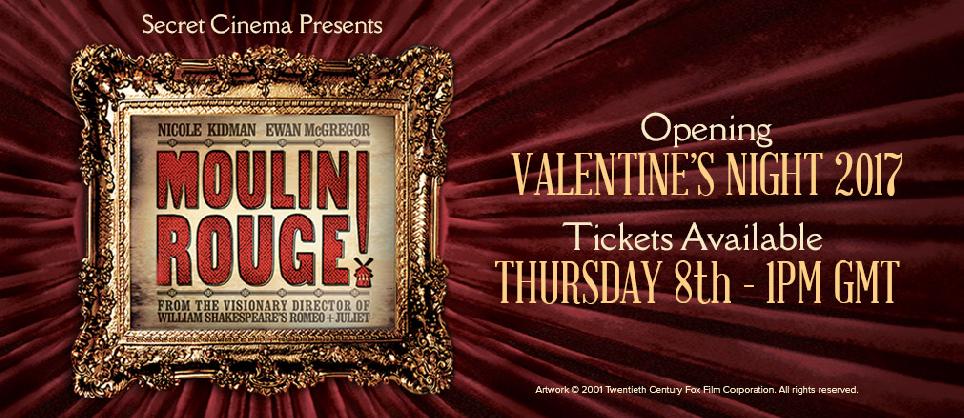
 RSS Feed
RSS Feed
